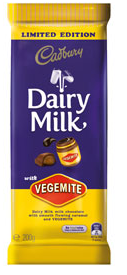I had heard the news that Cadbury had decided to release a new block of chocolate – Dairy milk chocolate with ‘smooth flowing caramel and VEGEMITE”! Initially I thought it was a joke! I was at my local Coles supermarket today and there were EVERYWHERE! I am not a fan of Vegemite at all, I could not think of a worse combination. However, for those that love Vegemite, there are some things you need to know!
Ingredients:
Full cream milk, sugar, wheat glucose syrup, cocoa butter, cocoa mass, invert sugar, yeast extract (from yeast grown on barley and wheat), milk solids, sweetened condensed milk, vegetable fat, salt, emulsifiers (Soy lecithin, 476), malt extract (from barley), colour (150c), flavours.
Breaking this label down, there are four areas that we need to look at:
1) Yeast Extract (from yeast grown on barley and wheat)
This is the first time I have seen yeast extract labeled in this way, ie “From yeast grown on barley and wheat”. The manufacturers must be starting to realise that consumers are more educated, and by stipulating this extra information, the average consumer will presume that yeast extract is natural and thereby safe.
It should be noted that yeast extract always contains some MSG^. So yeast extract isn’t pure MSG, however it contains MSG, even if it has been derived from a natural source. Many manufacturers like to use yeast extract in their products as they are not required to label the product as containing MSG. MSG is an excitotoxin that shrivels and kills brain cells. An excitotoxin is a chemical that causes a brain cell to become overexcited and fire uncontrollably, leading to cell death. Common adverse reactions resulting from MSG can also include:
- asthma
- hyperactivity
- depression
- mood changes
- sleeplessness
- nausea
- migraines
2) Malt extract (from barley)
Barley malt extract – is an additive that frequently includes MSG (free glutamic acid) – it is addictive and makes you want to eat lots of them!! Refer above for the symptoms commonly associated with MSG.
3) Colour 150c
Colour 150c – Caramel III (Ammonia Caramel) can cause symptoms of gastro intestinal problems, hyperactivity and is prohibited in foods for infants.
4) Flavours
Many manufacturers use labeling loopholes to avoid listing every ingredient on their products. Flavours are not required to be described on a food label as their chemical composition is very complex! We actually don’t know how many ingredients are included in this ingredient ‘Flavours’ or what these are. You can try calling Cadbury to find out, however, they would not be required to disclose as this is often their ‘trade secret’ or ‘formula’.
^ Excitotoxins: the Taste that Kills, Dr Russell Blaylock (a professor of neurosurgery at the Medical University of Mississippi)
I think I would prefer a block of plain Cadbury Dairy Milk than one served with a dose of harmful food additives. Has anyone tried it? What’s your thoughts?



 My passion and mission is to work with families to reduce the overwhelm when going additive free. Moving to additive free living can bring back peace, calm and joy to families. I know it's possible and I've experienced it first hand with my 5 boys.
My passion and mission is to work with families to reduce the overwhelm when going additive free. Moving to additive free living can bring back peace, calm and joy to families. I know it's possible and I've experienced it first hand with my 5 boys.




I have to say that you are totally incorrect that free glutamates are MSG. Whilst MSG is a pure chemical additive free glutamates occur naturally in thousands of goods including mushrooms, cheeses, stewed meats and breast milk. Glutamic acid is one of the most common amino acids in the human body and occurs naturally and is released during cooking. There is absolutely no evidence that free glutamates have any negative effects on health and actually allergies to free glutamates are very rare. It is deceptive to tell people that extracts of yeast are MSG. As a senior scientist I prefer fact before misinformation
Hi Bradley, thanks for your comment. You are correct in that low levels of free glutamates do occur naturally in many foods. If you aren’t allergic or intolerant to MSG, eating MSG at these quantities isn’t a problem. At normal levels in our system glutamates allow cells in the brain to communicate with each other. The issue is when excessive amounts are consumed, the brain cells die. In these normal foods that contain free glutamate, different amino acids compete to get into the brain, so only a little enters the brain. Manufacturers have worked out that MSG can be produced from any food protein by hydrolyzing vegetable proteins, wheat proteins, or milk protein. These excessive amounts at much higher concentrations gets into the brain causing excitotoxic effects. There is plenty of fact and evidence available if you choose to research it. I know personally that all forms of free glutamates have negative impacts on my children and I, we are sensitive to it. The point of this article is to share this information, for those that may not be aware and also sensitive.
Bradley Wardrop-Brown I’m not sure if your argument pointing out that free glutamates aren’t “technically” MSG is intentionally disingenuous or if you just honestly suffer from the Dunning-Kruger effect. But what I do know is that you and you food-additive-industry-shill-sounding argument just got lit’rally OWNED by ADMIN’s response. Lol, REJECTED.
l2science mister “senior scientist”. =p
Wow I just googled Bradley’s name and guess what I found on linkedin?
Bradley Wardrop-Brown
Director and Principal Food Scientist at BOI Food Tech & Packaging
Ya he’s just a “senior scientist” totally unbiased, definitely not an industry shill.